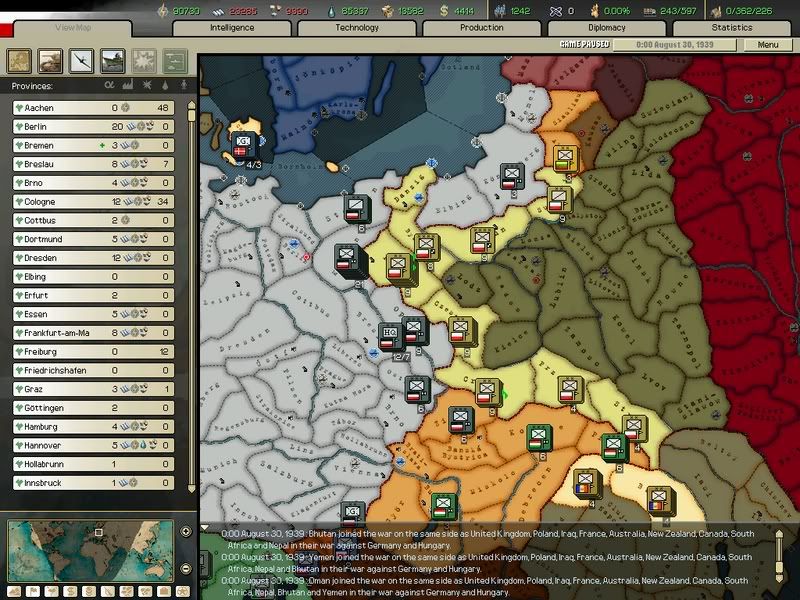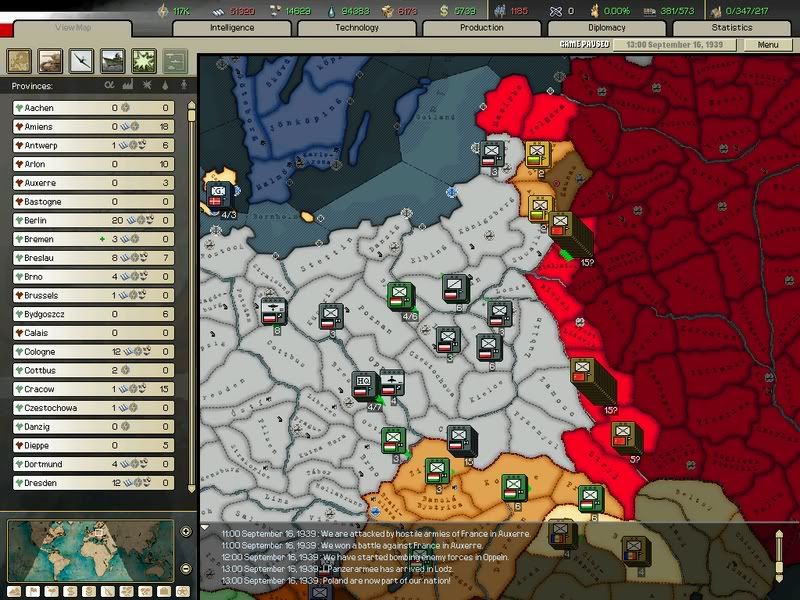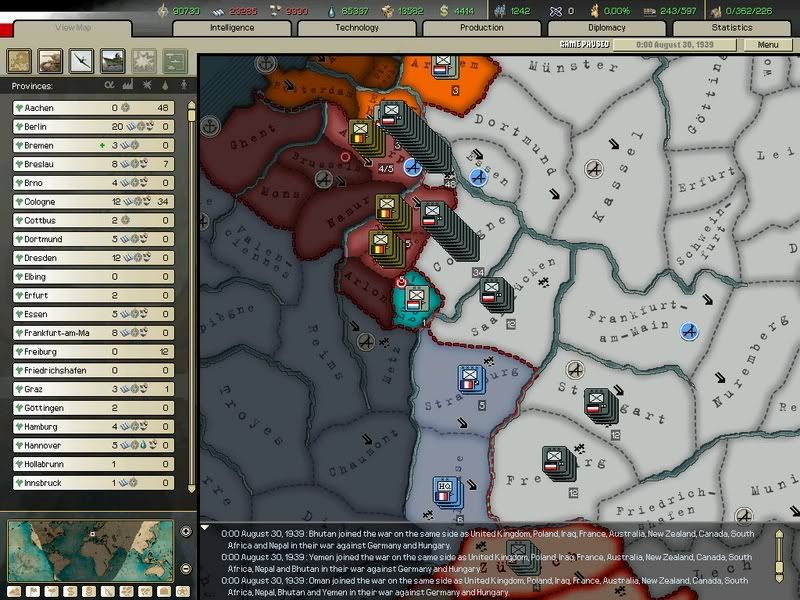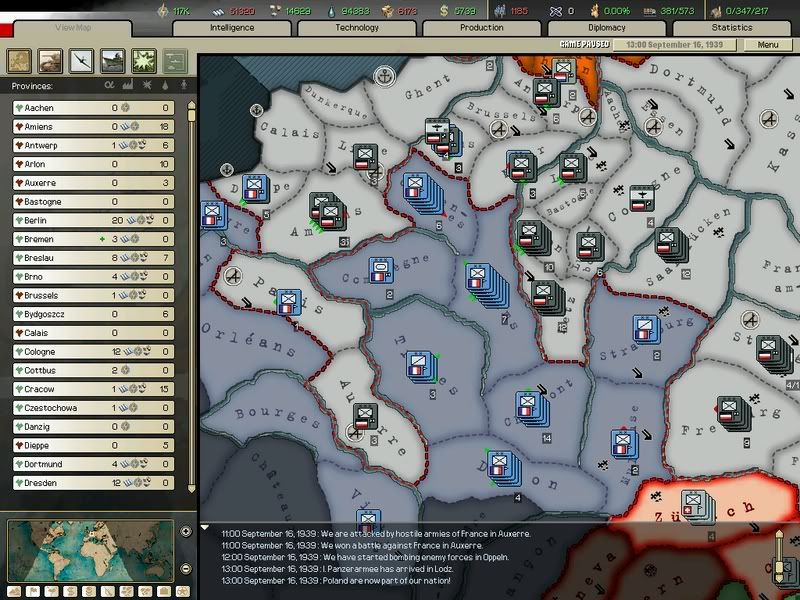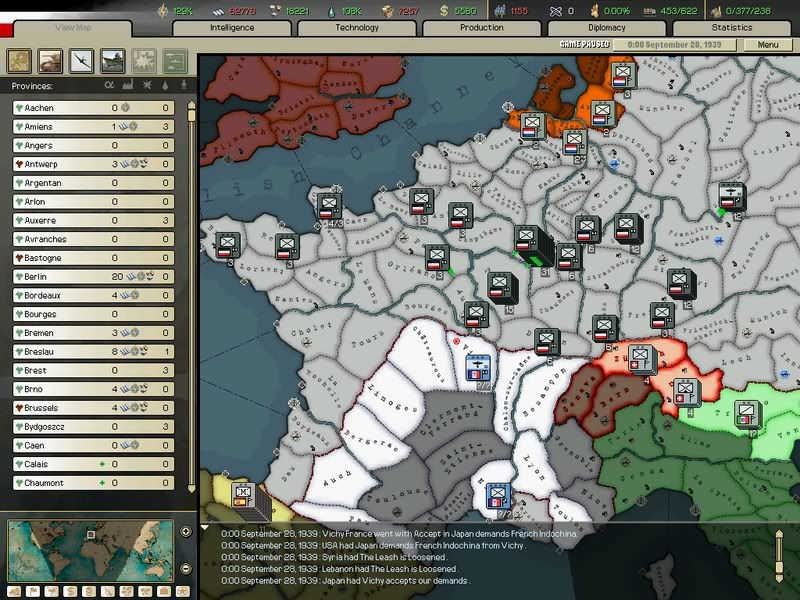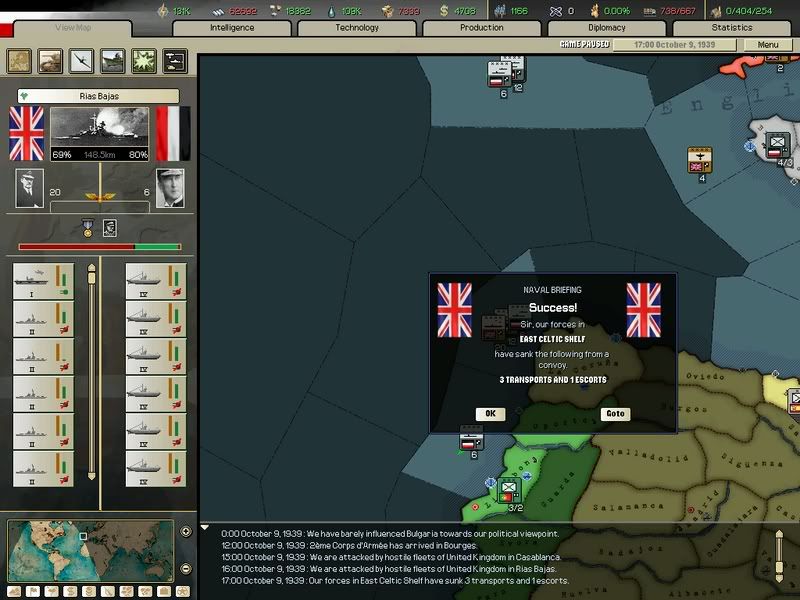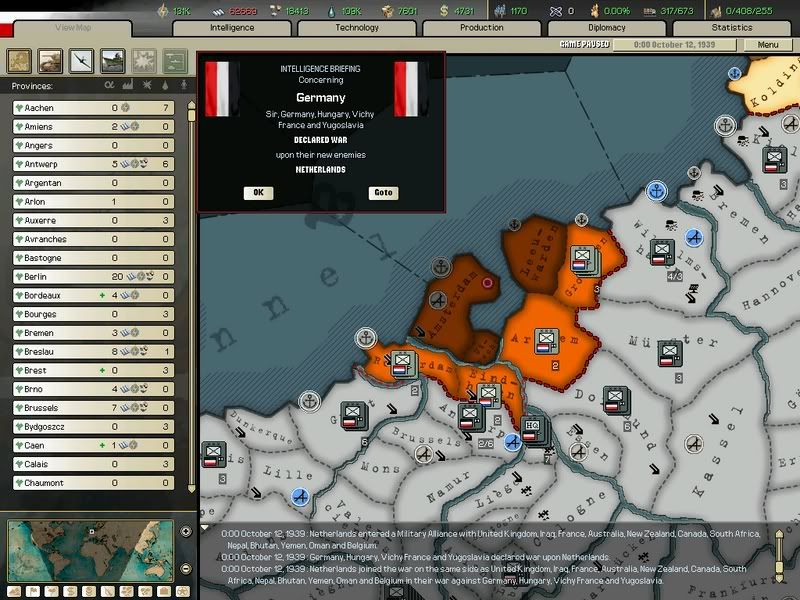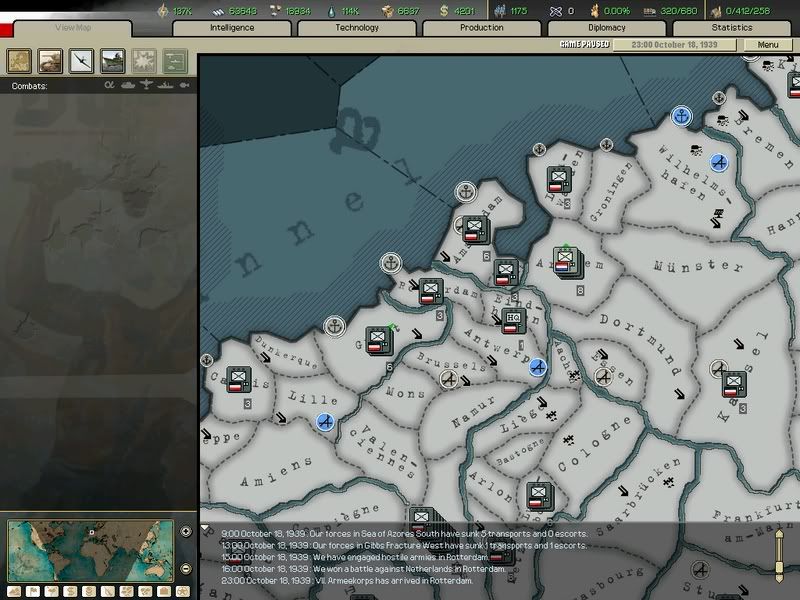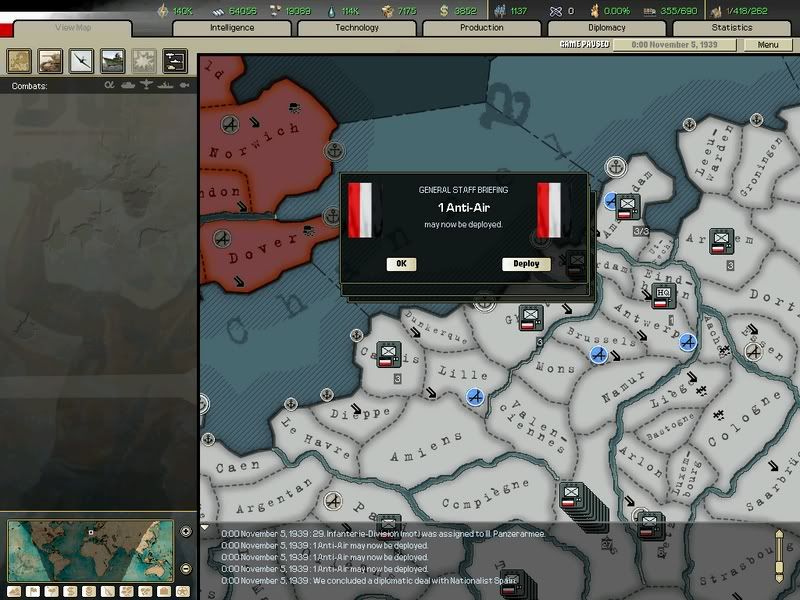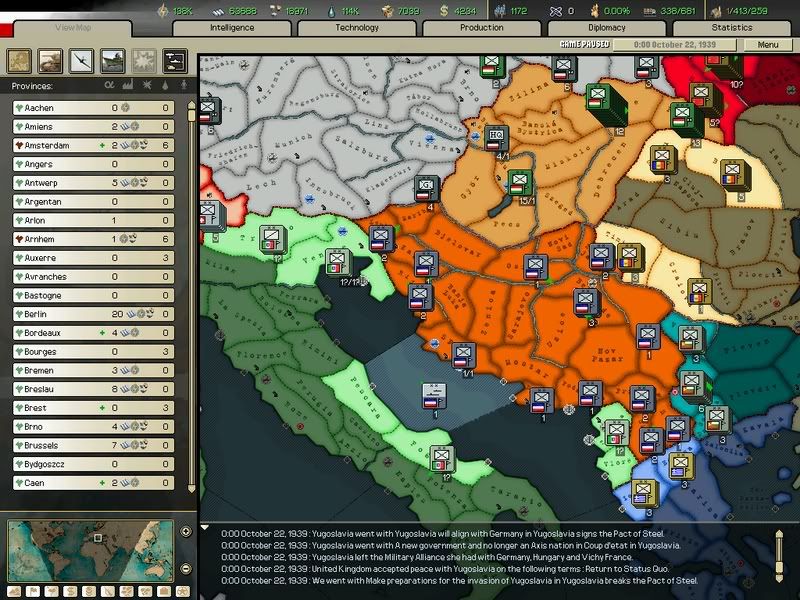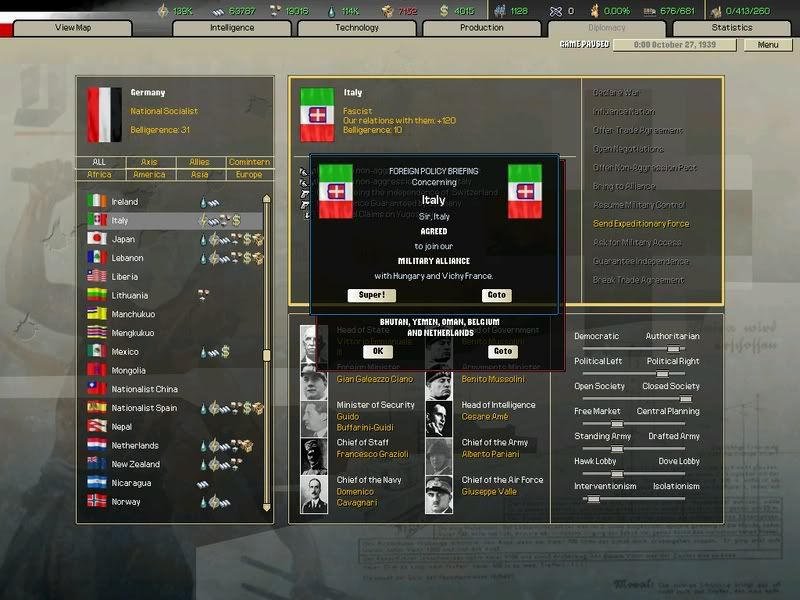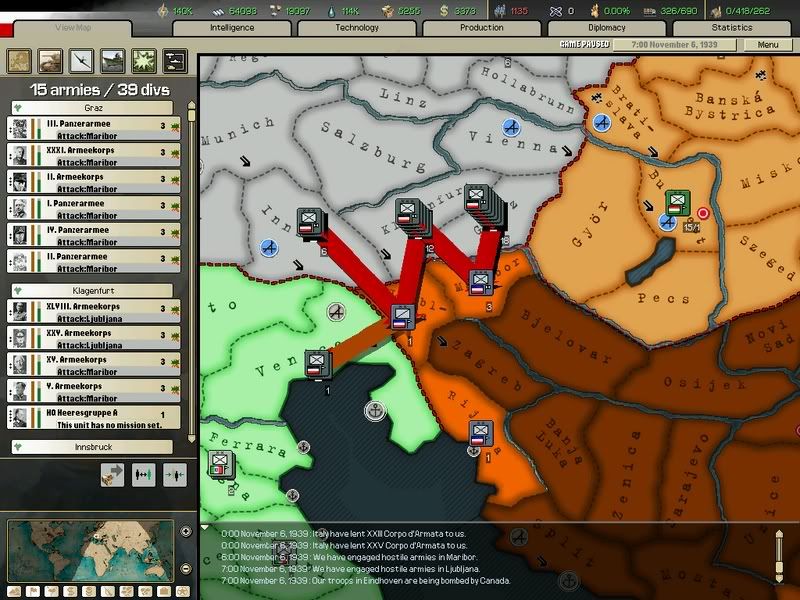Festung Europa - Germany 1936
TASK: Conquer Europe, and eventually the world.
CONDITIONS: DAIM-installed, Normal/Aggressive. Normally such a task would be far too easy; but I will place the following (historical) limitations upon myself: first, I will build a true Festung Europa (Fortress Europe) by holding off on invading Great Britain until I have forced a Bitter Peace upon the Soviet Union. While I hold off on invading them, I will build an Atlantic Wall that stretches the entire length of my exposed beaches. Furthermore, I will pursue a historical German naval strategy - no carriers, very few capital ships, and LOTS of subs. I intend to starve UK into submission before I pole-vault the Channel. And finally, I will not build NAVs. They are simply too strong. If I need to exert some air power over the seas, my CAS's and TAC's will have to do.
STANDARDS: The only standard, of course, is complete domination over the world. I shall not rest until every corner of the globe is under my jackboot. However, I am setting these goals for myself:
-Belgium by 10 September 1939
-Poland by 15 September 1939
-France by 1 October 1939
-Netherlands by 1 November 1939
-Yugoslavia and Greece by 1 February 1940
-Denmark, Sweden, Finland, and Norway by 1 May 1940
-Soviet Union (Bitter Peace) before the bad weather of Winter 1940 sets in
-the rest of Europe (including Switzerland and anyone else who is not my ally) by 1 May 1941
-the British Isles by 1 September 1941.
...and from there, the sky's the limit. Maybe I will let the Italians take out Africa while I rush through the Middle East and eviscerate China and the rest of the Soviet Union from the South. Maybe I will attempt an invasion of the United States. Who knows? Maybe I have bitten off more than I can chew and will succumb to the scourge of the Allies.
I hope you have as much fun reading this as I will writing it.
Chapter 1: The Long and Winding Road to War
Chapter 2: We'll March in Backwards and Tell Them We're Leaving
Chapter 3: The Road to Paris Goes Through Belgium
Chapter 4: Welcome to the Winning Team, Pierre
Chapter 5: Stabbed in the Back
Chapter 6: War is the Common Cry
Chapter 7: Reshuffling the Balkan Map
Chapter 8: We are to be Powerful, Beautiful, and Without Regret
Chapter 9: The Sword and the Fennoscandian Shield
Chapter 10: The Eye of the Hurricane
Chapter 11: The Ravens Still Fly
Chapter 12: Danse Macabre
Chapter 13: God Created Panzers to Train the Faithful
Chapter 14: Collapse and Resurgence
Chapter 15: The Woe of Aftermath
Chapter 16: A Portal of Discovery, a Lesson of Wisdom
Festung Europa

Germany 1936 AAR

Germany 1936 AAR
TASK: Conquer Europe, and eventually the world.
CONDITIONS: DAIM-installed, Normal/Aggressive. Normally such a task would be far too easy; but I will place the following (historical) limitations upon myself: first, I will build a true Festung Europa (Fortress Europe) by holding off on invading Great Britain until I have forced a Bitter Peace upon the Soviet Union. While I hold off on invading them, I will build an Atlantic Wall that stretches the entire length of my exposed beaches. Furthermore, I will pursue a historical German naval strategy - no carriers, very few capital ships, and LOTS of subs. I intend to starve UK into submission before I pole-vault the Channel. And finally, I will not build NAVs. They are simply too strong. If I need to exert some air power over the seas, my CAS's and TAC's will have to do.
STANDARDS: The only standard, of course, is complete domination over the world. I shall not rest until every corner of the globe is under my jackboot. However, I am setting these goals for myself:
-Belgium by 10 September 1939
-Poland by 15 September 1939
-France by 1 October 1939
-Netherlands by 1 November 1939
-Yugoslavia and Greece by 1 February 1940
-Denmark, Sweden, Finland, and Norway by 1 May 1940
-Soviet Union (Bitter Peace) before the bad weather of Winter 1940 sets in
-the rest of Europe (including Switzerland and anyone else who is not my ally) by 1 May 1941
-the British Isles by 1 September 1941.
...and from there, the sky's the limit. Maybe I will let the Italians take out Africa while I rush through the Middle East and eviscerate China and the rest of the Soviet Union from the South. Maybe I will attempt an invasion of the United States. Who knows? Maybe I have bitten off more than I can chew and will succumb to the scourge of the Allies.
I hope you have as much fun reading this as I will writing it.
Chapter 1: The Long and Winding Road to War
Chapter 2: We'll March in Backwards and Tell Them We're Leaving
Chapter 3: The Road to Paris Goes Through Belgium
Chapter 4: Welcome to the Winning Team, Pierre
Chapter 5: Stabbed in the Back
Chapter 6: War is the Common Cry
Chapter 7: Reshuffling the Balkan Map
Chapter 8: We are to be Powerful, Beautiful, and Without Regret
Chapter 9: The Sword and the Fennoscandian Shield
Chapter 10: The Eye of the Hurricane
Chapter 11: The Ravens Still Fly
Chapter 12: Danse Macabre
Chapter 13: God Created Panzers to Train the Faithful
Chapter 14: Collapse and Resurgence
Chapter 15: The Woe of Aftermath
Chapter 16: A Portal of Discovery, a Lesson of Wisdom
Last edited:


